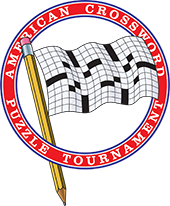Puzzler's delight
Source: Boston GlobeDate: March 23, 2003
Byline: Marc Romano
Puzzler's delight
THE GRAND BALLROOM of the Marriott Hotel in Stamford, Connecticut, is the size of a Zeppelin hangar, but it was barely large enough to hold the 495 people who gathered last weekend for the 26th annual American Crossword Puzzle Tournament, the country's premier gathering of cruciverbalists. A crossword tournament isn't just another clash of the titans, nerd-style. In contrast to, say, the Super Bowl or a Scrabble championship, the most unforgiving opponents are not other players but devilishly clever puzzle constructors, not to mention the clock.Before the opening heat, Will Shortz — puzzle editor of The New York Times, tournament organizer, and benevolent despot of the crossword world — laid down the rules: 10 points per correctly filled-in word, 150 points for a correct whole puzzle, 25 points for each minute under the time limit, and variable penalties for each incorrectly filled-in square.
As the heat began, a hush descended upon the room, followed by the sound of 495 #2 pencils scratching. A dozen referees milled about, waiting to pounce the moment contestants raised their hands to signal they'd finished. Each puzzler sat behind a manila-paper screen, there less to prevent cheating ("Doesn't happen," says Shortz) than to ensure the requisite sensory deprivation.
Katherine Bryant, a freelance editor from Cambridge, finished before anyone else, clocking 2:49. (Her speed didn't serve her well; she ended the tournament ranked 57th.) She was shaking with adrenaline, like a racehorse after the Kentucky Derby.
The puzzles got harder as the contest went on, following the same rules that make Friday's Times crossword harder than Monday's: more puns and wordplay, more "openness" (i.e., fewer black squares). The hardest puzzle was the fifth, featuring the tricky clue "Clear writing" — correctly answered ERASE, not PROSE, as most puzzlers had it. Very clever, but no match for the Times's legendary pre-Election Day puzzle in 1996, where the clue "Tomorrow's headline" could be correctly answered with either CLINTONWINS or BOBDOLEWINS.
The competitors were mostly white, middle-class, and borderline eccentric, with fashion tastes running to crossword earrings and a crossword headscarf held in place with a giant pencil. As Daniel Okrent, a retired editor for Time magazine who now lives on Cape Cod, pointed out, "The dork quotient is high." One participant, a lean, mutton-chopped redhead named Brendan Quigley, 28, of Allston, commented, "Where else can you talk about puzzles without feeling like a complete freak?"
When Quigley isn't constructing puzzles for The Times or St. Martin's Press, he's playing in his indie rock band Hip Tanaka. The winner was a cabaret pianist, Joe Delfin of New York City, who also won last year. Musicians, along with mathematicians, were particularly well-represented — perhaps, Okrent speculated jokingly, "because they're good at visually absorbing a lot of information and don't have social lives." (Okrent, who has a social life, placed 76th.)
The opening reception on Friday night featured an address by Jean Rossat, celebrated puzzle constructor and director of the French national crossword championship. But the Stamford tournament was pretty much an all-American affair. "You have to be immersed in the culture to do well here," Shortz said. "You really have to have grown up in America." The only person ever to receive a bachelor's degree in enigmatology (the study of puzzles) from Indiana University, or any university anywhere, Shortz passionately believes that solving puzzles makes for more informed, more engaged, and just plain better human beings.
Perhaps Shortz is right — the contestants certainly seemed more focused on socializing than on winning. Imagine a 10-letter row and a clue like "Answer to the world's problems." CAPITALISM? TECHNOLOGY? STOPSADDAM? In Stamford, they would have answered CROSSWORDS.

